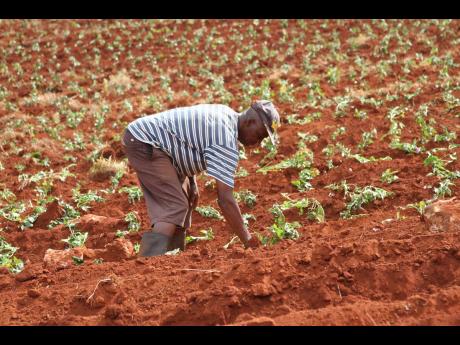MP blasts bauxite companies for short-changing farmers
BERRY HILL, Manchester:
A search with the keywords ‘bauxite mining’ in the Gleaner archives yields more than 4,000 articles, with more than half that number highlighting the cries of residents and stakeholders who have railed against the industry’s negative effects.
On a recent visit to several communities across Manchester, residents argued that they had lost much more than they had gained and pressed the Holness administration to exert greater sway in ensuring that bauxite-mining agreements are fair.
Mirthen Richards has leased 21 acres of mined-out land in Berry Hill, but said that agriculture’s prospects in the parish have been dented.
“If we had more land, we could do more farming, but bauxite mine out most of the land ... . If the rest of lands of lands properly dump up, once we get rain, we all right,” the 68-year-old told The Gleaner.
Manchester North West Member of Parliament Mikael Phillips said that over the past six years, farmers and other interests have suffered at the expense of commercial progress.
Phillips hauled bauxite companies over the coals for failing to quickly reintegrate farmers into economic activity after they are displaced.
“Don’t wait until after you mine, you build two greenhouse give them. By the time they are to wait until mining finishes to get that benefit, hunger kill him and he is poorer than before you found him,” the MP told The Gleaner.
Queries made to a number of bauxite companies as to the protocols surrounding compensation packages, land reclamation, among other issues, yielded little fortune, as representatives were either unreachable or postponed comment.
Phillips, who identified lands in more than three communities as being owned by bauxite miners, said that more than 80 per cent of those spaces are currently being used for cultivation and cattle rearing.
He said that MPs of scarred constituencies are allocated $4 million every three years by the Jamaica Bauxite Institute. But that, in his opinion, is not nearly enough.
“Just imagine the effect of that on the agricultural sector in a constituency like North West Manchester, which depends solely on agriculture ... . When you look at what damage is done to the communities and you get back nothing,” he said.
COMPENSATION DISPARITY
Phillips also criticised the perceived wide disparity in compensation packages given to rural households, compared to those who live in cities.
“Country people shorted compared to Kingston people. When you look at the roadwork on Hagley Park Road and what those people sold the frontage of those properties for the widening of the road, compared to those in St Thomas, you realise the difference in pricing,” said Phillips.
The MP said only those who can secure legal representation to facilitate better negotiations receive reasonable benefit.
Phillips said that while bauxite was important to Jamaica’s economic development, communities have not benefited sufficiently from the levy over decades. He is disappointed that promised subdivisions in south Manchester and St Ann have not been completed.
“You hear the cry of the people not being able to collect the title of the land they have been relocated to,” he said.
In the central Manchester community of Berry Hill, farmers echoed similar sentiments, citing numerous losses since bauxite companies entered the area.
In a multidisciplinary review of the bauxite-alumina industry in Jamaica, conducted between March and August 2020, the Jamaica Environment Trust (JET) said that an estimated US$1 billion in revenue was brought in by the industry yearly, but argued that the social costs outweighed the benefits.
“In examining the impact of bauxite mining operations on the environment, abuse of the ecological heritage emerged as a main finding,” JET said.
“It is clear that bauxite mining has damaged ecosystems and ecological processes. Less than 0.5 per cent of land has been rehabilitated to forest designation.”
Lance Neita, public relations officer at Noranda Bauxite, in an email response to questions posed, said that an environmental impact assessment was currently being conducted by the National Environment and Planning Agency (NEPA). He declined substantive comment.
“This is a normal process mandated by the mining regulations and it is obligatory on our part to respectfully await the findings of NEPA on this matter,” said Neita.
“We are, therefore, constrained from any public discussions on mining at this time, and will be willing to assist you with our comments once this assessment is completed.”

